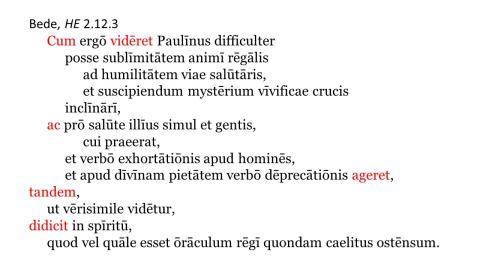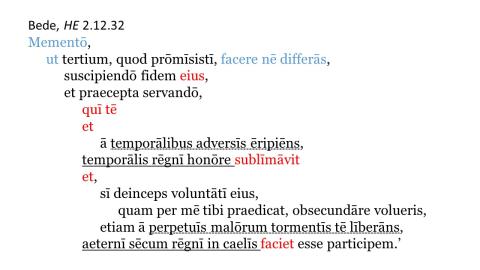<Vt Eduīnī per vīsiōnem quondam sibi exulī ostēnsum sit ad crēdendum prōvocātus>
[1] Haec quidem memorātus pāpa Bonifatius dē salūte rēgis Eduīnī ac gentis ipsīus litterīs agēbat. [2] Sed et ōrāculum caeleste, quod illī quondam exulantī apud Redvaldum rēgem Orientālium Anglōrum pietās dīvīna revēlāre dignāta est, nōn minimum ad suscipienda vel intellegenda doctrīnae monita salūtāris sēnsum iūvit illīus. [3] Cum ergō vidēret Paulīnus difficulter posse sublīmitātem animī rēgālis ad humilitātem viae salūtāris et suscipiendum mystērium vīvificae crucis inclīnārī, ac prō salūte illīus simul et gentis cui praeerat et verbō exhortātiōnis apud hominēs, et apud dīvīnam pietātem verbō dēprecātiōnis ageret, tandem, ut vērisimile vidētur, didicit in spīritū, quod vel quāle esset ōrāculum rēgī quondam caelitus ostēnsum. [4] Nec exinde distulit, quīn continuō rēgem ammonēret explēre vōtum, quod in ōrāculō sibi exhibitō sē factūrum prōmīserat, sī temporis illīus erumnīs exemtus ad rēgnī fastīgia pervenīret.
[5] Erat autem ōrāculum huiusmodī. Cum persequente illum Aedilfridō, quī ante eum rēgnāvit, per dīversa occultus loca vel rēgna multō annōrum tempore profugus vagārētur, tandem vēnit ad Redvaldum, obsecrāns ut vītam suam ā tantī persecūtōris īnsidiīs tūtandō servāret; quī libenter eum excipiēns prōmīsit sē quae petēbātur esse factūrum. [6] At postquam Aedilfrid in hāc eum prōvinciā appāruisse et apud rēgem illīus familiāriter cum sociīs habitāre cognōvit, mīsit nūntiōs quī Redvaldō pecūniam multam prō nece eius offerrent; neque aliquid prōfēcit. [7] Mīsit secundō, mīsit tertiō, et cōpiōsiōra argentī dōna offerēns et bellum īnsuper illī, sī contemnerētur, indīcēns. [8] Quī vel minīs frāctus, vel corruptus mūneribus, cessit dēprecantī, et sīve occīdēre sē Eduīnum seu lēgātāriīs trādere prōmīsit. [9] Quod ubi fīdissimus quīdam amīcus illīus animadvertit, intrāvit cubiculum quō dormīre dispōnēbat (erat enim prīma hōra noctis), et ēvocātum forās, quid ergā eum agere rēx prōmīsisset, ēdocuit, et īnsuper adiēcit: ‘Sī ergō vīs, hāc ipsā hōrā ēdūcam tē dē hāc prōvinciā, et ea in loca intrōdūcam, ubi numquam tē vel Redvald vel Aedilfrid invenīre valeant.’ [10] Quī ait: ‘Grātiās quidem agō benevolentiae tuae; nōn tamen hoc facere possum quod suggeris, ut pactum quod cum tantō rēge iniī ipse prīmus irritum faciam, cum ille mihi nīl malī fēcerit, nīl adhūc inimīcitiārum intulerit. [11] Quīn potius, sī moritūrus sum, ille mē magis quam ignōbilior quisque mortī trādat. [12] Quō enim nunc fugiam, quī per omnēs Brittaniae prōvinciās tot annōrum temporumque curriculīs vagābundus hostium vītābam īnsidiās?’ [13] Abeunte igitur amīcō, remānsit Eduīnī sōlus foris residēnsque maestus ante palātium, multīs coepit cōgitātiōnum aestibus afficī, quid ageret quōve pedem verteret nescius.
[14] Cumque diū tacitīs mentis angōribus et caecō carperētur ignī, vīdit subitō intempestā nocte silentiō appropinquantem sibi hominem vultūs habitūsque incognitī; quem vidēns, ut ignōtum et inopīnātum nōn parum expāvit. [15] At ille accēdēns salūtāvit eum, et interrogāvit quārē illā hōrā, cēterīs quiēscentibus et altō sopōre pressīs, sōlus ipse mestus in lapide pervigil sedēret. [16] At ille vicissim sciscitābātur, quid ad eum pertinēret, utrum ipse intus an foris noctem trānsigeret. [17] Quī respondēns ait: ‘Nē mē aestimēs tuae maestitiae et īnsomniōrum et forinsēcae et sōlitāriae sessiōnis causam nescīre; sciō enim certissimē quī es, et quārē maerēs et quae ventūra tibi in proximō mala formīdās. [18] Sed dīcitō mihi quid mercēdis dare velīs eī, sīquī sit, quī hīs tē mērōribus absolvat, et Redvaldō suādeat ut nec ipse tibi aliquid malī faciat, nec tuīs tē hostibus perimendum trādat.’ [19] Quī cum sē omnia quae posset huic tālī prō mercēde beneficiī datūrum esse respondēret, adiēcit ille: ‘Quod sī etiam rēgem tē futūrum exstīnctīs hostibus in vēritāte prōmittat, ita ut nōn sōlum omnēs tuōs prōgenitōrēs sed et omnēs, quī ante tē rēgēs in gente Anglōrum fuerant, potestāte trānscendās?’ [20] At Eduīnī cōnstantior interrogandō factus nōn dubitāvit prōmittere, quīn eī, quī tanta sibi beneficia dōnāret, dignīs ipse grātiārum āctiōnibus respondēret. [21] Tum ille tertiō: ‘Sī autem,’ inquit, ‘is quī tibi tanta tāliaque dōna vērāciter adventūra praedīxerit, etiam cōnsilium tibi tuae salūtis ac vītae melius atque ūtilius quam aliquis dē tuīs parentibus aut cognātīs umquam audīvit, ostendere potuerit, num eī obtemperāre et monita eius salūtāria suscipere cōnsentīs?’ [22] Nec distulit Eduīnī, quīn continuō pollicērētur in omnibus sē secūtūrum doctrīnam illīus, quī sē tot ac tantīs calamitātibus ēreptum ad rēgnī apicem prōveheret. [23] Quō acceptō respōnsō, cōnfestim is quī loquēbātur cum eō imposuit dexteram suam capitī eius dīcēns: ‘Cum hoc ergō tibi signum advēnerit, mementō huius temporis ac loquellae nostrae, et ea quae nunc prōmittis, adimplēre nē differās.’ [24] Et hīs dictīs, ut ferunt, repente dispāruit, ut intellegeret nōn hominem esse quī sibi appāruisset, sed spīritum.
[25] Et cum rēgius iuvenis sōlus adhūc ibīdem sedēret, gāvīsus quidem dē conlātā sibi cōnsōlātiōne, sed multum sollicitus ac mente sēdulā cōgitāns, quis esset ille vel unde venīret, quī haec sibi loquerētur, vēnit ad eum praefātus amīcus illīus, laetōque vultū salūtāns eum: ‘Surge,’ inquit, ‘intrā, et sōpītīs ac relictīs cūrārum ānxietātibus, quiētī membra simul et animum compōne, quia mūtātum est cor rēgis, nec tibi aliquid malī facere, sed fidem potius pollicitam servāre dispōnit; postquam enim cōgitātiōnem suam, dē quā tibi ante dīxī, rēgīnae in sēcrētō revēlāvit, revocāvit eum illā ab intentiōne, ammōnēns quia nūllā ratiōne conveniat tantō rēgī amīcum suum optimum in necessitāte positum aurō vēndere, immō fidem suam, quae omnibus ōrnāmentīs pretiōsior est, amōre pecūniae perdere.’ [26] Quid plūra? [27] Fēcit rēx ut dictum est; nec sōlum exulem nūntiīs hostīlibus nōn trādidit, sed etiam eum ut in rēgnum pervenīret adiūvit. [28] Nam mox redeuntibus domum nūntiīs, exercitum ad dēbellandum Aedilfridum colligit cōpiōsum, eumque sibi occurrentem cum exercitū multum imparī (nōn enim dederat illī spatium, quō tōtum suum congregāret atque adūnāret exercitum), occīdit in fīnibus gentis Merciōrum ad orientālem plāgam amnis, quī vocātur Idlæ; in quō certāmine et fīlius Redvaldī, vocābulō Raegnherī, occīsus est. [29] Ac sīc Eduīnī iuxtā ōrāculum, quod accēperat nōn tantum rēgis sibi īnfēstī īnsidiās vītāvit, vērum etiam eīdem peremtō in rēgnī glōriam successit.
[30] Cum ergō praedicante verbum Deī Paulīnō rēx crēdere differret, et per aliquod tempus, ut dīximus, hōrīs competentibus sōlitārius sedēret, quid agendum sibi esset, quae religiō sequenda, sēdulus sēcum ipse scrūtārī cōnsuēsset, ingrediēns ad eum quādam diē vir Deī imposuit dexteram capītī eius et, an hoc signum agnōsceret, requīsīvit. [31] Quī cum tremēns ad pedēs eius prōcidere vellet, levāvit eum et quasi familiārī vōce affātus: ‘Ecce,’ inquit, ‘hostium manūs, quōs timuistī, Dominō dōnante ēvāsistī; ecce rēgnum quod dēsīderāstī ipsō largiente percēpistī. [32] Mementō ut tertium, quod prōmīsistī, facere nē differās, suscipiendō fidem eius et praecepta servandō, quī tē et ā temporālibus adversīs ēripiēns temporālis rēgnī honōre sublīmāvit et, sī deinceps voluntātī eius, quam per mē tibi praedicat, obsecundāre volueris, etiam ā perpetuīs malōrum tormentīs tē līberāns aeternī sēcum rēgnī in caelīs faciet esse participem.’
notes
vocabulary
NOTE: Lemmatization of Anglo-Saxon Names
—: declined forms unattested
[ ]: nominative forms unattested (back-formed for purposes of lemmatization)
*: form unattested but hypothesized based on existing patterns
memorō memorāre memorāvī memorātus: to remember
pāpa –ae or –ātis m.: a father, pope
Bonifātius –iī m.: Boniface, Pope Boniface IV, 608-615
Aeduini –ī m.: Edwin, King of the Northumbrians, 616-633
ōrāculum –ī n.: oracle, prophecy
exsulō exsulāre exsulāvī exsulātus: to be in exile
Reduald –ī m.: Rædwald, King of the East Angles, d.616x627
Anglī –ōrum m.: the Angles, a Germanic tribe; the English
dīvīnus –a –um: divine
re-vēlō –vēlāre: to unveil, uncover
dignō dignāre: to consider worthy
doctrīna –ae f.: teaching, doctrine
salūtāris –e: healthful, wholesome
Paulīnus –ī m.: Paulinus, Bishop of York, 625-633; bishop of Rochester, 633-644
difficulter: with difficulty
sublīmitās –ātis f.: height, loftiness
rēgālis –e: regal, kingly
humilitās –ātis f.: lowness
salūtāris –e: healthful, wholesome
mystērium –ī n.: mystery, religious rite, sacrament
vīvificus –a –um: life-giving
crux crucis f.: cross
inclīnō inclīnāre inclīnāvī inclīnātus: to influence
praesum praeesse praefuī praefutūrus: to be before; be present
exhortātiō –ōnis f.: sermon
dīvīnus –a –um: divine
dēprecātiō –ōnis f.: a plea (by prayer)
vērīsimilis –e: seeming true, probable
ōrāculum –ī n.: oracle, prophecy
caelitus: from heaven
exinde (abbrev. exin): from that place
continuus –a –um: connected
admoneō admonēre admonuī admonitus: to admonish, remind
expleō explēre explēvī explētus: to fill up, fulfil
ōrāculum –ī n.: oracle, prophecy
exhibeō exhibēre exhibuī exhibitum : to produce
aerumna –ae f.: toil, trouble
eximō eximere exēmī exēmptus: to take away, remove
fastīgium fastīgi(ī) n.: summit
ōrāculum –ī n.: oracle, prophecy
hūiusmodī: of this sort
persequor persequī persecūtus sum: to pursue
Aedilfrid –ī m.: Æthelfrith, King of the Northumbrians, 592-616
rēgnō rēgnāre rēgnāvī rēgnātus: to rule
occulō occulere occuluī occultus: to cover
profugus –ī m.: fugitive, exile
vagor –ārī –ātus sum: to wander about
Reduald –ī m.: Rædwald, King of the East Angles, d.616x627
obsecrō obsecrāre obsecrāvī obsecrātus: to beseech
persecutor –ōris m.: persecutor, enemy
īnsidiae īnsidiārum f. pl.: ambush
tūtor tūtāvī tūtātus sum: to protect
libenter: willingly
Aedilfrid –ī m.: Æthelfrith, King of the Northumbrians, 592-616
familiāriter: as a friend, intimately, closely
socius –iī m.: ally, comrade
habitō habitāre habitāvī habitātus: to inhabit
nūntius –a –um: announcing, that which makes known
Reduald –ī m.: Rædwald, King of the East Angles, d.616x627
nex necis f.: killing, murder
prōficiō prōficere prōfēcī prōfectum: to advance
cōpiōsus –a –um: plentiful
īnsuper: above, overhead
minae –ārum f. pl.: threats
dēprecor dēprecārī dēprecātus sum: to ward off (from one's self or others) by earnest prayer
occidō occidere occidī occāsus: to go down; set; fall
Aeduini –ī m.: Edwin, King of the Northumbrians, 616-633
lēgātārius –a –um: like an envoy or legate, legatine
fīdus –a –um: faithful, trustworthy
amīcus amīcī m.: male friend
animadvertō animadvertere animadvertī animadversus: to turn to, give mind to
cubiculum –ī n.: bedroom
dispōnō dispōnere dispōsuī dispōsitus: to place, arrange, distribute
ēvocō ēvocāre ––– ēvocātus: to call out, summon
forās: out of doors
ergā: towards
ēdoceō –ēre –uī –tus: to teach completely; communicate
īnsuper: above, overhead
adiciō adicere adiēcī adiectus: to throw to
intrōdūcō intrōdūcere intrōdūxī intrōductum: to lead in, introduce
Reduald –ī m.: Rædwald, King of the East Angles, d.616x627
Aedilfrid –ī m.: Æthelfrith, King of the Northumbrians, 592-616
benevolentia benevolentiae f.: goodwill
suggerō –ere –gessī –gestus: to bring or put under or up to; supply
pactum pactī n.: way, manner
tantō: by so much
ineō inīre iniī/inīvī initus: to enter
irritus –a –um: invalid, void
inimīcitia inimīcitiae f.: enmity, hostility
potius: rather, more
ignōbilis –e: unknown
Britannia –ae f.: Britain
curriculum –ī n.: career
vagābundus –a –um: wandering, roaming, roving; as subst., wanderer, vagrant, vagabond
īnsidiae īnsidiārum f. pl.: ambush
amīcus amīcī m.: male friend
remaneō remanēre remānsī remānsus: to stay behind
Aeduini –ī m.: Edwin, King of the Northumbrians, 616-633
forīs: out of doors outside
resīdō –ere –sīdere –sēdī: to sit down, sink down, shrink
palātium –ī n.: palace, royal residence
cōgitātiō cōgitātiōnis f.: thinking
aestus aestūs m.: heat
nescius –a –um: ignorant
cumque: whenever, always
tacitus –a –um: silent
angor –ōris m.: anguish, torment
carpō carpere carpsī carptum: to pluck, seize
intempestus –a –um: unseasonable; unpleasant; gloomy
silentium silenti(ī) n.: silence
appropinquō appropinquāre appropinquavī: to approach, draw near
habitus habitūs m.: garment, attire; way of life
incognitus –a –um: unknown, unnoticed, unperceived
īgnōtus –a –um: unknown
inopīnātus –a –um: unexpected, unforeseen
ex–pavēscō –pavēscere –pāvī –—: to dread
salūtō salūtāre salūtāvī salūtātus: to greet
sopor –ōris m.: sleep; sound
pervigil –ilis: keeping watch all night, awake
vicissim or vice: in turn
scīscitor –scīscitārī : to examine, interrogate
intus: within, inside
forīs: out of doors outside
trānsigō trānsigere trānsēgī trānsāctum: to stab
aestimō aestimāre aestimāvī aestimātus: to appraise
maestitia –ae f.: grief
īnsomnium –iī n.: that which comes in sleep; a dream
forīnsecus –a –um: outdoor, outside
sōlitārius –a –um : lonely, solitary
sessiō –ōnis f.: a sitting; a sitting idly
proximus proximī m.: neighbor
formīdō formīdinis f.: fear
mercēs mercēdis f.: pay, wages
vēlum vēlī n.: sail
sīquis or sīquī sīqua sīquid: if any (one)
maeror maerōris m.: mourning, grief
absolvō –ere –solvī –solūtum: to absolve (someone of)
Reduald –ī m.: Rædwald, King of the East Angles, d.616x627
suādeō suādēre suāsī suāsus: to recommend
perimō –ere –ēmī –ēmptus: to take away completely; annihilate
mercēs mercēdis f.: pay, wages
adiciō adicere adiēcī adiectus: to throw to
futūrus –a –um: about to be; future
exstinguō exstinguere exstinxī exstinctus: to extinguish
vēritās vēritātis f.: truth
prōgenitor –ōris m.: ancestor
Anglī –ōrum m.: the Angles, a Germanic tribe; the English
trān–scendō –scendere –scendī –scēnsum: to climb over, surmount
Aeduini –ī m.: Edwin, King of the Northumbrians, 616-633
actiō actiōnis f.: action
vērāx –ācis : speaking truly, true, veracious; adv. vērāciter, truthfully.
praedīcō praedīcere praedīxī praedictus: to say beforehand; foretell
cognātus cognātī m.: relative
obtemperō obtemperāre obtemperāvī obtemperātus: to obey, comply
salūtāris –e: healthful, wholesome
cōnsentiō cōnsentīre cōnsēnsī cōnsēnsus: a
Aeduini –ī m.: Edwin, King of the Northumbrians, 616-633
continuō: immediately
polliceor pollicērī pollicitus sum: to promise
doctrīna –ae f.: teaching, doctrine
calamitās calamitātis f.: loss, failure
apex –icis m.: the point of anything; peak
prōvehō –ere –vexī –vectus: to carry forward or forth; (pass.)
acceptus –a –um: welcome, acceptable, pleasing
respōnsum respōnsī n.: answer
cōnfestim: immediately
dextera dextera f.: right hand
suum –ī n. or sua –ōrum n.: one's property
loquēla –ae f.: talking; speech; word
adimpleō adimplēre –ēvī –ētum : to fill up with, fulfill
dictum dictī n.: word; saying
repente: suddenly
dispāreō dispārēre dispāruī: to vanish
ibīdem: in the same place
cōnsōlātiō –ōnis f.: a consolation, comfort
sollicitus –a –um: worried
sēdulus –a –um: careful, cautious
praefor –fātus sum: to say beforehand; praefātus: aforementioned
amīcus amīcī m.: male friend
salūtō salūtāre salūtāvī salūtātus: to greet
sōpiō sōpīre sōpīvī sōpītum: to put to sleep, lull to sleep
ānxietās –tātis f.: anxiety, worry, tribulation
potius: rather, more
polliceor pollicērī pollicitus sum: to promise
dispōnō dispōnere dispōsuī dispōsitus: to place, arrange, distribute
cōgitātiō cōgitātiōnis f.: thinking
rēgīna rēgīnae f.: queen
sēcrētum –ī n.: anything apart; a solitary place
re-vēlō –vēlāre: to unveil, uncover
intentiō –ōnis f.: purpose; intension; fervor
admoneō admonēre admonuī admonitus: to admonish, remind
amīcus amīcī m.: male friend
suum –ī n. or sua –ōrum n.: one's property
positus –a –um: located
vendō vendere vendidī venditus: to sell
immō: no indeed
ōrnāmentum –ī n.: equipment
pretiōsus –a –um : expensive, costly, precious
exul/exsul exsulī m.: exile
hostīlis hostīlis hostīle: hostile
adiuvō adiuvāre adiūvī adiūvatus: to help, assist, support
dēbellō dēbellāre dēbellāvī dēbellātus: to war to the end; to put down by war; subdue
Aedilfrid –ī m.: Æthelfrith, King of the Northumbrians, 592-616
cōpiōsus –a –um: plentiful
impār –aris: unequal, in unequal combat
congregō congregāre congregāvī congregātus: to assemble, collect
adūnō –āre: unite, unify, combine
occidō occidere occidī occāsus: to go down; set; fall
Merciī –ōrum m.: the Mercians, the people of the march, or midlands
orientālis –e: of the east, easterly
plāga –ae f.: blow
Idlae: the river Idle, a tributary of the Trent
certāmen certāminis n.: contest, struggle
Reduald –ī m.: Rædwald, King of the East Angles, d.616x627
vocābulum –ī n.: a designation, name
Raegenheri — m.: Regenhere, Son of King Rædwald 1 of the East Angles, d.625
occidō occidere occidī occāsus: to go down; set; fall
Aeduini –ī m.: Edwin, King of the Northumbrians, 616-633
iūxtā: according to
ōrāculum –ī n.: oracle, prophecy
īnfestus –a –um: hostile, aggressive
īnsidiae īnsidiārum f. pl.: ambush
perimō –ere –ēmī –ēmptus: to take away completely; annihilate
succēdō succēdere successī successus: to follow
praedicō –āre –āvī –ātum: to preach
Paulīnus –ī m.: Paulinus, Bishop of York, 625-633; bishop of Rochester, 633-644
competo –ere: to fit, be suitable, appropriate, applicable
sōlitārius –a –um : lonely, solitary
religiō religiōnis f.: religion
sēdulus –a –um: careful, cautious
scrūtor scrūtārī scrūtātus sum: examine thoroughly, search
consueō –ēre: to be accustomed
dextera dextera f.: right hand
āgnōscō āgnōscere āgnōvī agnitus: to recognize
requīrō requīrere requīsīvī requīsītus: to seek
tremō tremere tremuī: to tremble
prō–cidō –cidere –cidī –—: to fall down
levō levāre levāvī levātus: to raise; make light
familiāris familiāre: domestic, intimate
adfor –fātus sum: to speak to; address
dominus dominī m.: lord; Lord (of Jesus Christ)
ēvādō ēvādere ēvāsī ēvāsus: to go out, evade
largior –ītus sum –dep.: to give largely; bestow
percipiō percipere percēpī perceptus: to take in
temporālis –e: of or belonging to time, temporal
temporālis –e: of or belonging to time, temporal
sublīmō –āre –āvī –ātus: elevate
deinceps: in order
praedicō praedicāre praedicāvī praedicātus: to proclaim
obsecundō –secundāre: to be compliant
tormentum tormentī n.: torture
līberō līberāre līberāvī līberātus: to free
particeps participis m.: participant



